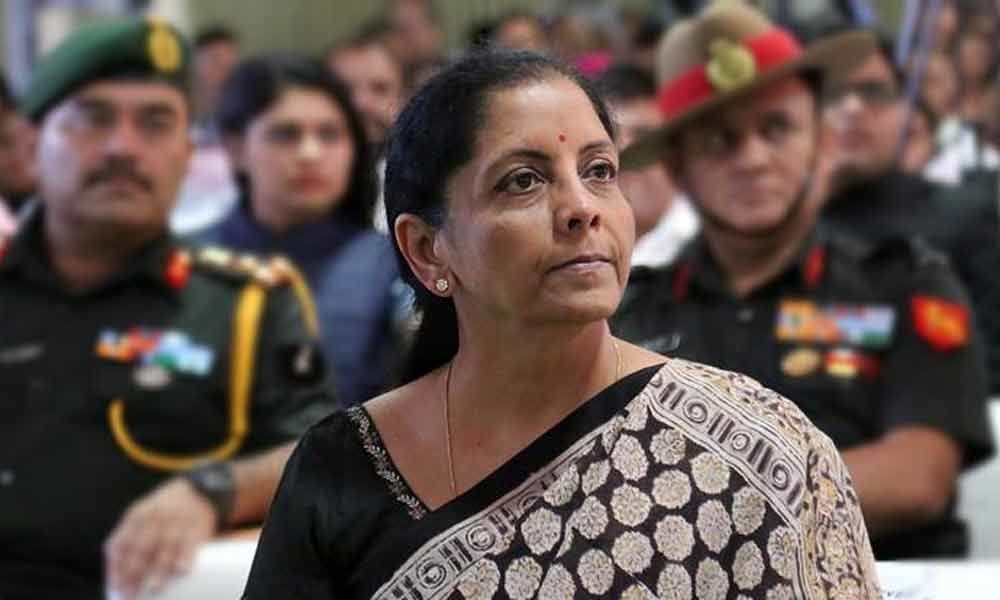Live
- NASA Tracks Five Giant Asteroids on Close Approach to Earth Today
- Pushpa 2 Hits ₹1000 Crore in 6 Days: How It Compares to Other Top Indian Films
- Vivo X200 and X200 Pro Launched in India: Price, Specifications, and Features
- Nitin Gadkari Admits Feeling Embarrassed at Global Summits Over Rising Road Accidents in India
- Opposition Slams ‘One Nation, One Election’ Bill as Anti-Democratic; BJP Allies Support the Move
- Celebrate Karthigai Maha Deepam Virtually with Sri Mandir’s LIVE Darshan Experience
- BJP Extends Support to Samagra Shiksha Abhiyan Employees' Strike, Demands Immediate Regularization and Welfare Benefits
- Dr. M. Priyanka Stresses Quality Education, Nutritious Meals, and Cleanliness in Schools
- Mandal Level CM Cup Sports Concludes in Ija with Promising Talent and Enthusiastic Participation
- Harish Rao Slams Revanth Reddy: "More Talk, Less Action"
Just In

US President Trump's administration imposed sanctions on China's military over Beijing's purchase of the S-400 and other military hardware.
New Delhi: India is hopeful it will avoid US sanctions over its purchase of Russia's S-400 missile system, Defence Minister Nirmala Sitharaman was quoted by news agency AFP.
New Delhi has been "heard and understood" by the US administration over its accord to buy the S-400 missile defence system for USD 5.2 billion, the minister said in an interview to news agency AFP this week.
Prime Minister Narendra Modi made the deal with Russian President Vladimir Putin in October, defying US warnings of sanctions on countries buying Russian military equipment. The sanctions were part of measures to punish Moscow for its actions in Ukraine in 2014.
President Donald Trump's administration imposed sanctions on China's military last year over Beijing's purchase of the S-400 and other military hardware.
It has also warned NATO member Turkey of sanctions for buying the S-400, and has suspended Turkey's participation in a US jet programme.
Sitharaman said that Washington has taken on board that India, bordering both Pakistan and China, needed arms from Russia, and others, to remain a "strong partner".
Negotiations with Moscow, a longstanding supplier to India's military, on the S-400 began before the US sanctions were introduced, she said.
"In the case of S-400 we have explained ourselves well... That has been heard and understood," Ms Sitharaman said. "They have appreciated the point of view put forward."
Asked if she was confident that India would avoid sanctions, Sitharaman said: "Yes I hope so."
Cold water
Before the deal was signed, Washington poured cold water on India's efforts to obtain a waiver from the US Countering America's Adversaries Through Sanctions Act (CAATSA).
Upgrades in arms systems "including the S-400 air and missile defence system" would be a particular focus for CAATSA, a US State Department spokesperson was quoted as saying by news agency PTI.
But Randall Schriver, Assistant Secretary of Defense for Indo-Pacific Security Affairs, told a hearing in March that Washington wanted to "work through" the problem, calling India "an important emerging strategic partner."
He added however that India's contract with Russia has not been completed and that the US was "very keen to see (India) make an alternative choice (to the S-400) and we are working with them to provide potential alternatives."
China
Washington is in a tricky position with India. It wants to bolster ties with India to counter China's assertiveness, a trend which has also rattled New Delhi.
In 2017, India and China had a military standoff over a Himalayan plateau claimed by both Beijing and Bhutan, a close ally of India.
Since then China and India have sought to patch up relations, including at a meeting between PM Modi and President Xi Jinping at Wuhan, China in April 2018.
"Sometimes there are differences and you have a face-off," Sitharaman said. "But our attempt, particularly after the prime minister's Wuhan meet with the Chinese president, our attempt has been that these differences... cannot be allowed to become disputes."
But China has also made inroads in Sri Lanka and the Maldives – countries that India considers to be in its sphere of influence – through its One Belt, One Road Initiative (OBOR), also known as the Belt and Road Initiative (BRI).
India has particular concerns about a series of projects passing through Pakistan-occupied Kashmir.
China has also blocked efforts to put on a UN sanctions blacklist Masood Azhar, the leader of Jaish-e-Mohammed that claimed a suicide bombing in Pulwama in Jammu and Kashmir on February 14 that killed 40 paramilitary troops.
New Delhi has reportedly declined a Chinese invitation to take part in an OBOR forum in China later this month.
"Areas which are ours legally, which are under illegal occupation of Pakistan, are the ones which are becoming part of the China-Pakistan Economic Corridor," Sitharaman said.
"So having made that position very clear, we have not participated in anything to do with OBOR, and we stick to that position," she said.

© 2024 Hyderabad Media House Limited/The Hans India. All rights reserved. Powered by hocalwire.com







